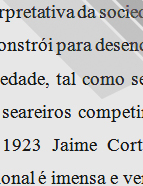

................................
After his work on the expedition commanded by Pedro Álvares Cabral, which resulted in the discovery of Brazil, Jaime Cortesão delved into historical problems as they were being reconsidered in Europe’s more advanced academic circles, particularly in France. The influence of Henri Pirenne would prompt a remarkable revision of historical matters, especially regarding the interpretation of history through geography. In 1925, Cortesão gave a lecture in Lisbon, at the Universidade Livre, aptly titled As relações entre a geografia e a história de Portugal [The Relationship between Geography and the History of Portuga l]. Knowledge of space (and its importance for studying societies over time) became one of Jaime Cortesão's crucial contribution s to the History of Portugal – hence his pursuit of understanding the art of navigation and the tools developed to achieve this undertaking. This complemented Sérgio's legacy, which was primarily focused on economics and sociology. However, in Cortesão, geographical understanding would be emphasised. The interaction between man and his environment was something that touched the former doctor more than any other Portuguese historian of that period. "A tomada e ocupação de Ceuta” ["The conquest and occupation of Ceuta"] (Cortesão, “O sigilo” ["Secrecy"]; Id., “A tomada” ["The conquest"]) Consequently, deserved prominence was given to the hypothesis raised by Sérgio and discussed by David Lopes, although other research was also taken into consideration, such as that of Pedro de Azevedo and Teixeira de Sampaio. With considerable delay and excellent bibliographic support, Cortesão relished in highlighting Portugal's situation in large-scale commerce, between the North Sea and especially the Mediterranean Sea, the sea through which valuable goods brought from Asia travelled, particularly spices. Sérgio believed t hat large-scale trade was in crisis and that the conquest of Ceuta could solve it; Lopes' stance was that the city was an important maritime port with strategic interest for combating piracy. He agreed with Pedro de Azevedo, pointing out that the interests of the "merchant class" and those of nobility ultimately converged in the enterprise of Ceuta. However, as always, Cortesão was bolder and managed to envision in the conquest of the African stronghold the beginnings of a "plan for discoveries and, consequently, for a larger expansion." Moreover, he foresaw that its "ultimate goal was India and its commerce." He enthusiastically conclude d that this was how "a national salvation act was executed." (Cortesão, “A tomada”, pp. 26-27).
